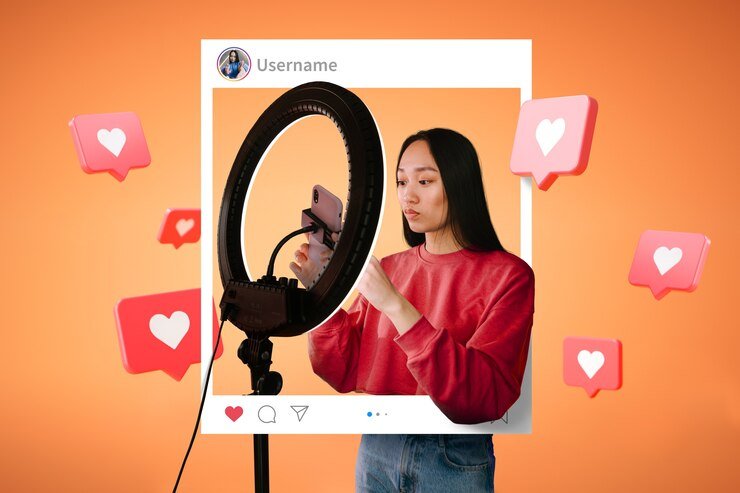In the ever-evolving landscape of digital marketing, one strategy has risen to prominence, reshaping the way brands connect with consumers: influencer marketing. From humble beginnings as a niche tactic to its current status as a powerhouse in the marketing realm, influencer marketing has undergone a remarkable evolution. In Business Onbording comprehensive exploration, we’ll delve into the journey of influencer marketing, its profound impact on consumer behavior, and the best practices for brands looking to leverage this dynamic strategy to promote their products and services.
What Is Influencer Marketing

- Influencer marketing is a form of marketing that leverages individuals with a dedicated and engaged following on social media platforms to promote products, services, or brands. These individuals, known as influencers, have established credibility and trust within their niche or industry, allowing them to influence the purchasing decisions of their followers.
- In influencer marketing, brands collaborate with influencers to create sponsored content that showcases their products or services in a compelling and authentic way. This content may take various forms, including sponsored posts, product reviews, tutorials, endorsements, and sponsored events or experiences.
- In recent years, influencer marketing has become increasingly prevalent and diverse, spanning across various social media platforms such as Instagram, YouTube, TikTok, Facebook, Twitter, and blogs. As the digital landscape continues to evolve, influencer marketing remains a dynamic and effective strategy for brands to connect with consumers in authentic and meaningful ways.
The Genesis of Influencer Marketing
The roots of influencer marketing can be traced back to the early days of social media, where individuals with sizable followings began to wield significant influence over their audiences. These early influencers, often bloggers or social media personalities, shared authentic content and cultivated engaged communities around their interests and expertise. Brands soon recognized the potential of partnering with these influencers to reach their target audiences in a more authentic and relatable way than traditional advertising methods allowed.
The Evolution of Influencer Marketing

Over the years, influencer marketing has evolved from a novel approach to a mainstream marketing strategy embraced by brands across industries. Several key factors have contributed to this evolution:
- Expansion of Social Media Platforms: As social media platforms proliferated and diversified, so did the opportunities for influencer marketing. From Instagram and YouTube to TikTok and Twitch, influencers now have a multitude of platforms to connect with their audiences, each offering unique content formats and engagement opportunities.
- Professionalization of Influencer Industry: As the influencer industry matured, influencers became savvy entrepreneurs, treating their channels as businesses and honing their content creation skills. Brands, in turn, began to view influencer partnerships as integral components of their marketing strategies, leading to the establishment of influencer agencies, talent management firms, and influencer marketing platforms.
- Shift Toward Micro-Influencers: While mega-influencers with millions of followers continue to command attention, brands are increasingly turning to micro-influencers—individuals with smaller but highly engaged followings—to reach niche audiences and drive authentic engagement.
The Impact of Influencer Marketing on Consumer Behavior
Influencer marketing has fundamentally altered the way consumers discover, evaluate, and purchase products and services. Its impact on consumer behavior can be observed across various stages of the buyer’s journey:
- Awareness and Discovery: Influencers serve as trusted sources of recommendations and inspiration, introducing their followers to new products and trends through authentic, relatable content.
- Consideration and Evaluation: Consumers often turn to influencers for in-depth reviews, tutorials, and demonstrations, seeking valuable insights and recommendations to inform their purchasing decisions.
- Purchase and Conversion: Influencers’ endorsements and promotions can sway consumer preferences and drive purchase intent, leading to increased sales and conversions for brands.
- Retention and Loyalty: Beyond the initial purchase, influencers can help foster long-term relationships between brands and consumers by sharing ongoing experiences, updates, and testimonials.
Best Practices for Collaborating with Influencers

To harness the full potential of influencer marketing, brands must approach collaborations with influencers strategically and authentically. Here are some best practices to guide successful influencer partnerships:
- Define Clear Objectives: Begin by establishing clear, measurable goals for your influencer marketing campaign, whether it’s increasing brand awareness, driving website traffic, or generating sales.
- Identify the Right Influencers: Take the time to research and identify influencers whose values, audience demographics, and content align closely with your brand’s identity and target market.
- Focus on Authenticity and Transparency: Encourage influencers to create authentic, genuine content that resonates with their audience while clearly disclosing sponsored partnerships in compliance with relevant regulations and guidelines.
- Provide Creative Freedom: Empower influencers to express their creativity and individuality in their content creation process, allowing for authentic storytelling and engagement with their audience.
- Establish Clear Expectations: Communicate your expectations, deliverables, and timelines clearly with influencers from the outset, ensuring alignment and accountability throughout the collaboration.
- Offer Value-Driven Partnerships: Provide influencers with value beyond monetary compensation, such as exclusive access to products, unique experiences, or opportunities for professional growth and development.
- Measure and Evaluate Performance: Track key performance metrics relevant to your campaign objectives, such as reach, engagement, conversions, and return on investment (ROI), to assess the effectiveness of your influencer partnerships and inform future strategies.
Influencer Marketing Platform
Influencer marketing platforms are online tools or marketplaces that connect brands with influencers, facilitating collaboration and campaign management. These platforms serve as intermediaries, streamlining the process of identifying, vetting, and collaborating with influencers for marketing campaigns. Here are some popular influencer marketing platforms:

- Influencer Marketing Hub: Influencer Marketing Hub offers a comprehensive platform that allows brands to search for influencers based on various criteria, manage campaigns, track performance metrics, and streamline communication with influencers.
- AspireIQ: Formerly known as Revfluence, AspireIQ is an influencer marketing platform that helps brands discover, manage, and measure influencer campaigns. It offers features such as influencer discovery, relationship management, content collaboration, and performance analytics.
- Upfluence: Upfluence is a comprehensive influencer marketing platform that provides brands with tools for influencer discovery, outreach, campaign management, and performance tracking. It offers a database of influencers across various niches and social media platforms.
- Traackr: Traackr is an influencer relationship management platform that helps brands identify, engage, and measure the impact of influencer marketing campaigns. It offers advanced features for influencer discovery, audience analysis, relationship management, and ROI tracking.
- CreatorIQ: CreatorIQ is an enterprise-level influencer marketing platform that caters to brands and agencies seeking to scale their influencer programs. It offers features such as influencer discovery, workflow automation, audience insights, and campaign analytics.
- HYPR: HYPR is an influencer marketing platform that specializes in influencer discovery and audience analytics. It offers brands access to a database of over 12 million influencers and provides insights into influencer demographics, audience demographics, and engagement metrics.
- Klear: Klear is an influencer marketing platform that offers brands tools for influencer discovery, campaign management, and performance tracking. It provides access to a database of influencers across multiple social media platforms and offers insights into influencer reach, engagement, and audience demographics.
- TapInfluence: TapInfluence is an influencer marketing platform that helps brands create, manage, and measure influencer campaigns. It offers features such as influencer discovery, content collaboration, performance tracking, and ROI analysis.
- Famebit by YouTube: Famebit is a self-service influencer marketing platform owned by YouTube. It allows brands to connect with YouTubers and other social media influencers to create branded content and sponsored campaigns directly on the platform.
- Influenster: Influenster is a product discovery and review platform that connects brands with influencers and consumers. It allows brands to distribute products for review and generate user-generated content through influencer partnerships.
Influencer Marketing Strategy
Developing an effective influencer marketing strategy requires careful planning, research, and execution. Here’s a step-by-step guide to crafting a successful influencer marketing strategy:

- Set Clear Goals and Objectives: Begin by defining your goals and objectives for the influencer marketing campaign. Whether it’s increasing brand awareness, driving website traffic, boosting sales, or enhancing brand perception, clearly outline what you hope to achieve.
- Build Relationships with Influencers: Establish genuine and authentic relationships with influencers based on mutual respect, trust, and collaboration. Reach out to influencers with personalized pitches that highlight the value proposition of partnering with your brand and offer compelling incentives for collaboration.
- Define Campaign Strategy and Messaging: Develop a clear and cohesive campaign strategy that outlines the campaign objectives, key messages, content themes, and deliverables. Collaborate with influencers to co-create content that aligns with your brand identity and resonates with their audience.
- Set Expectations and Guidelines: Clearly communicate your expectations, guidelines, and brand requirements to influencers to ensure consistency and alignment with your brand image and messaging. Provide influencers with creative freedom while maintaining brand authenticity and integrity.
- Negotiate Terms and Compensation: Negotiate terms of collaboration, compensation, and deliverables with influencers, taking into account factors such as content creation, posting frequency, exclusivity, usage rights, and payment structure.
- Track and Measure Performance: Implement tracking mechanisms and analytics tools to monitor the performance and effectiveness of your influencer marketing campaign. Track key performance indicators (KPIs) such as reach, engagement, impressions, click-through rates, conversions, and return on investment (ROI).
- Optimize and Iterate: Continuously monitor campaign performance and gather feedback from influencers and audience engagement to identify areas for optimization and improvement. Iterate on your influencer marketing strategy based on insights and learnings from past campaigns to refine your approach and achieve better results.
- Maintain Long-Term Relationships: Cultivate long-term relationships with influencers based on mutual trust, respect, and collaboration. Nurture ongoing partnerships with influencers who consistently deliver value and align with your brand objectives, fostering loyalty and advocacy over time.
Conclusion
Influencer marketing has emerged as a formidable force in the digital marketing landscape, reshaping the way brands connect with consumers and driving meaningful engagement and results. Its evolution from a novel tactic to a mainstream strategy reflects the shifting dynamics of consumer behavior and the power of authentic storytelling in today’s digital age. By understanding the origins, impact, and best practices of influencer marketing, brands can unlock the full potential of this dynamic strategy and forge genuine connections with their target audiences.
As we navigate the ever-changing landscape of digital marketing, influencer marketing stands as a testament to the enduring power of human connection and authentic communication in driving brand awareness, engagement, and loyalty. By embracing the principles of authenticity, transparency, and collaboration, brands can harness the transformative power of influencer marketing to elevate their presence, amplify their message, and forge lasting relationships with consumers in an increasingly crowded digital marketplace.
Influencer marketing is not merely a trend—it’s a paradigm shift that has redefined the way brands and consumers interact, communicate, and connect. As we look to the future, the influence of influencers will only continue to grow, shaping the way brands tell their stories, engage their audiences, and drive success in the digital age. Embrace the power of influencer marketing, and embark on a journey of authentic connection, meaningful engagement, and transformative growth in the ever-evolving landscape of digital marketing.



Leave a Reply